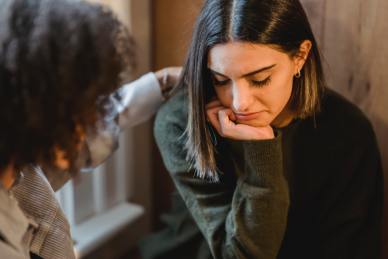Many people experience a social hangover or comedown after spending time with friends. Some people know it as con-drop. Others just recognise that social interactions have the cost of a night of rumination and worry or a morning of scattered brain. These experiences are not widely discussed, which means that folks can feel really ashamed when they have a hard time after an otherwise pleasurable social event. I think this is a great moment to start talking more about social hangovers and come downs because they are very likely to get more common as more places come out of lock down and people start to socialise more. The shift from relatively few social interactions to a great deal more social contact, and particularly contact with larger groups of people, is likely to cause increases in social anxiety, higher levels of adrenaline and cortisol in our blood as we have social contact, and consequent physiological changes once it is over.
So, why is this useful information? 3 main reasons:
1) It destigmatises the experience.

It sucks to feel alone, broken or like you’re over-reacting. But emotions happen – and social hangovers and come-down’s happen to a lot of people. This is a perfectly typical part of being human – albeit they are more common amongst neuroatypical folks. If we had more conversation about the experience we would be likely to have more compassion for ourselves and each other when it happened. We would be likely to be able to anticipate and plan ways to make it less awful, which brings me to the second point
2) It allows you to plan for it
I think it is useful to know that social hangovers and comedowns are likely to increase in the coming months because if we can anticipate something then we can plan for it. We can be thoughtful about how we schedule and pace social interactions with this in mind, rather than trying to jump back into a pre-pandemic level of socialising. By pacing ourselves, and experimenting with how often we socialise, in what settings, with what number of other people, we can start to figure out some of the things that make the post socialising experience harder and easier. Being curious about the experiences that you have, rather than judging or criticising yourself is a really effective way to gain more insight into how you work and how you can make things easier for yourself. I’m really into experimenting to see what brings up difficult emotional experiences, and what helps me to manage them better.
3) It helps you to support folks you love

Even if you’re not someone that typically experiences social comedowns or hangovers someone you love probably does. It can be easy to get critical or frustrated when someone has an experience that you don’t, and that you’ve never even heard of. Just knowing that it is a thing can help! It can make it more understandable when someone wants to limit the number of times they socialise, or wants to go home when you’d like to stay out for many more hours. It can help you to navigate differences in your desires around social time, and how much downtime is needed around it. If you are a neurotypical friend or partner of a neuroatypical person (or an introvert), it can help you to have empathy with the way they might be experiencing the costs of social time – and that is a really important way to counter the double empathy bind that neuroatypical people find themselves in a lot (Double empathy bind: neuroatypical folks being accused of lacking empathy when in a world made for neurotypicals that are unable to empathise with them/us).
Some things I’d invite you to consider:

1) Could you open a conversation with people about the concept of the social comedown? maybe even share this blog post 😉
2) Explore your experience: What kinds of social interaction bring up a hangover or comedown for you? Does the context, number of people, duration, ease of exit matter? What does it feel like to you? What helps you? What support could other people offer you?
3) Share your experience: Could you post a comment here, or when sharing this article to tell others how social hangovers and comedowns affect you? Do you think it would help others in your community if you shared your story? Would it help you to hear the stories other people have?


Reblogged this on Writing Radiation and commented:
This is so true. Having fibromyalgia, I already had some issues after social events (no matter how awesome they were). Talking about it is the first step – It’s more common than you’d think!
Yeah, I think when we are disabled it is easier to notice the emotional impact of social comedowns, because it so often comes alongside increases in pain or fatigue. I had a delightful day yesterday hanging out with someone I love dearly. We went for a swim and hung out into the evening. Today I’m noticing weird new pain in my left thigh, and that I’m feeling slightly out of sorts. Fortunately both are fairly mild. I hope that non-disabled folks can also recognise themselves in social comedowns, because I’m SURE they have them too!